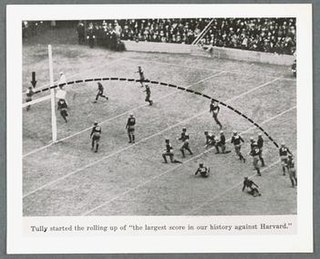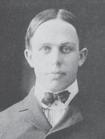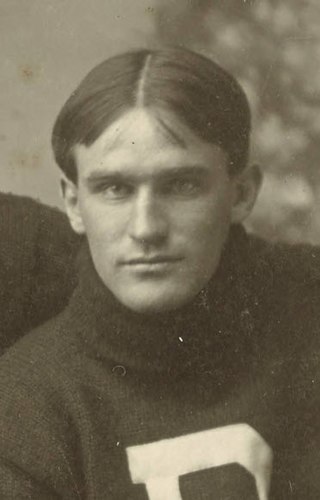Related Research Articles

Dartmouth College is a private Ivy League research university in Hanover, New Hampshire. Established in 1769 by Eleazar Wheelock, Dartmouth is one of the nine colonial colleges chartered before the American Revolution. Emerging into national prominence at the turn of the 20th century, Dartmouth has since been considered among the most prestigious undergraduate colleges in the United States.

Andrew James "Swede" Oberlander was an American football player and coach. He was an All-American halfback for Dartmouth College's Indians undefeated and national championship football team in 1925. Oberlander was inducted into the College Football Hall of Fame as a player in 1954.

Amos Parker Foster was an American college football and college basketball player and coach in the early 1900s. He was a 1904 graduate of Dartmouth College where he lettered in both basketball and football. Foster served as the head football coach at the University of Cincinnati (1904–1905), the University of Nebraska (1906), and Miami University (1907–1908), compiling a career college football coaching record of 30–9. He was also the head basketball coach at Cincinnati for five seasons from 1904 to 1909, tallying a mark of 30–10. After coaching he practiced law in Ohio.

Edward North "Robbie" Robinson was an American football and baseball coach. He served as the head football coach at University of Nebraska–Lincoln, Brown University, University of Maine, and Tufts College—now known as Tufts University, and co-head football coach at Boston University. He also coached for the Providence Steam Roller of the National Football League (NFL). He was inducted into the College Football Hall of Fame in 1955.

George Henry Schildmiller was an American football player and coach. He played for Dartmouth College and coached at the University of Maine in 1909 and at Oregon State University in 1910.

The 1925 college football season ended with no clear national champion. At the close of the season, noted sports writer Billy Evans described the championship contest as "a dead heat" among Dartmouth, Tulane, Michigan, Washington, and Alabama.

The Dartmouth Big Green football team represents Dartmouth College in NCAA Division I Football Championship Subdivision (FCS) college football competition as a member of the Ivy League. The team possesses a storied tradition that includes a national championship, and holds a record 21 Ivy League Football Championships with 11 College Football Hall of Fame inductees.

Frederick Everett Jennings was an American lawyer, banker, and college football coach. He served as the head coach at Dartmouth College in 1900 and amassed a record of 2–4–2.

Elmer George Schwartz, sometimes listed as George Elmer Schwartz, and nicknamed "Elmer the Great", was an American football player. He played college football at Washington State College. He was the captain of the 1930 Washington State Cougars football team that won the Pacific conference championship and lost to Alabama in the 1931 Rose Bowl. He was selected as a third-team All-American by the Associated Press at the end of the 1930 season.

The 1925 Dartmouth Indians football team was an American football team that represented Dartmouth College as an independent during the 1925 college football season. In its third season under head coach Jesse Hawley, the team compiled an 8–0 record, shut out five of eight opponents, and outscored all opponents by a total of 340 to 29. The team was designated as 1925 national champions by the Dickinson System and were awarded the Rissman Trophy after its creation the next year. They were also retroactively named champions by Parke H. Davis in the 1934 edition of Spalding's Foot Ball Guide.

The Dartmouth–Harvard football rivalry is an American college football rivalry between the Dartmouth Big Green and Harvard Crimson. The series began in 1882 and is considered one of the fifteen oldest rivalries in College football. Since the formation of the Ivy League in 1954, the annual game has been a key decider in the crowning of the league's champion. Dartmouth has captured a league-record 19 Ivy League championships, while the Crimson have obtained 17 titles, tied for third-most. Furthermore, since the start of round-robin play, Harvard and Dartmouth have posted the first- and second-best league winning percentages at 0.628 and 0.606 respectively.

The Cornell–Dartmouth football rivalry is an American college football rivalry between the Cornell Big Red and Dartmouth Big Green. The two schools were both major football powers before the split between the NCAA Division I Football Bowl Subdivision (FBS) and Football Championship Subdivision (FCS). Prior to the split, Cornell captured national championships in 1915, 1921, 1922, 1923, and 1939. Dartmouth won its lone national championship in 1925. One of the most infamous games in the rivalry contained national title implications. The 1940 game, referred to as the Fifth Down Game, ended Cornell's school-record 16 game unbeaten streak, as it sought a second consecutive national championship. After emerging with a 7–3 win, the Big Red voluntarily forfeited to Dartmouth when review of film showed the Cornell had inadvertently used five downs. The ESPN College Football Encyclopedia named the game, and Cornell's honorable concession, the second greatest moment in college football history.

The Dartmouth–New Hampshire football rivalry, referred to as the Granite Bowl, is an American college football rivalry game played between the Dartmouth College Big Green and University of New Hampshire Wildcats. The two teams first met in 1901 and have played regularly since then. The longest gap between games was 22 years, between 1934 and 1956. Dartmouth was initially dominant, winning 17 of the first 19 games. Then New Hampshire won 18 of the next 19 games. New Hampshire leads the series 21–19–2, with the most recent game played in 2023.
Abraham Lincoln Artz was an American football player and coach. He was an 1888 graduate of Dartmouth College in Hanover, New Hampshire. He played lettered as a halfback for the Dartmouth football team in 1886 and 1887. Artz served as the head football coach at Otterbein University in 1891, compiling a record of 2–1. His tenure included a season-opening victory over Ohio State.

The 2010 Dartmouth Big Green football team represented Dartmouth College in the 2010 NCAA Division I FCS football season. The Big Green were led by head coach Buddy Teevens in his sixth straight year and 11th overall and played their home games at Memorial Field. They are a member of the Ivy League. They finished the season 6–4 overall and 3–4 in Ivy League play, placing fifth. Dartmouth averaged 5,971 fans per game.

David Carr MacAndrew was an American football player and coach. He served as the head football coach at Bowdoin College in 1898, Western Reserve University—now known as Case Western Reserve University—from 1898 to 1899, and Saint Mary's College of California from 1915 to 1916, compiling a career college football coaching record of 19–18–1.
The 1928 Dartmouth Indians football team was an American football team that represented Dartmouth College as an independent during the 1928 college football season. In their sixth and final season under head coach Jesse Hawley, the Indians compiled a 5–4 record. Richard Black was the team captain.
The 1929 Dartmouth Indians football team was an American football team that represented Dartmouth College as an independent during the 1929 college football season. In their third season under head coach Jackson Cannell, the Indians compiled a 7–2 record. Ellsworth Armstrong was the team captain.
The 1929 All-Eastern football team consists of American football players chosen by various selectors as the best players at each position among the Eastern colleges and universities during the 1929 college football season.
The 1927 All-Eastern football team consists of American football players chosen by various selectors as the best players at each position among the Eastern colleges and universities during the 1927 college football season.
References
- ↑ "Praise for Marsters". Dartmouth Alumni Magazine. Retrieved 2023-11-14.
- ↑ Shribman, David; Degange, Jack (2004). Dartmouth College Football: Green Fields of Autumn. ISBN 9780738536118.
- ↑ "Ex-Yale Star, from Deathbed, Sends Marsters a Letter". Chicago Tribune. November 5, 1929. p. 24.